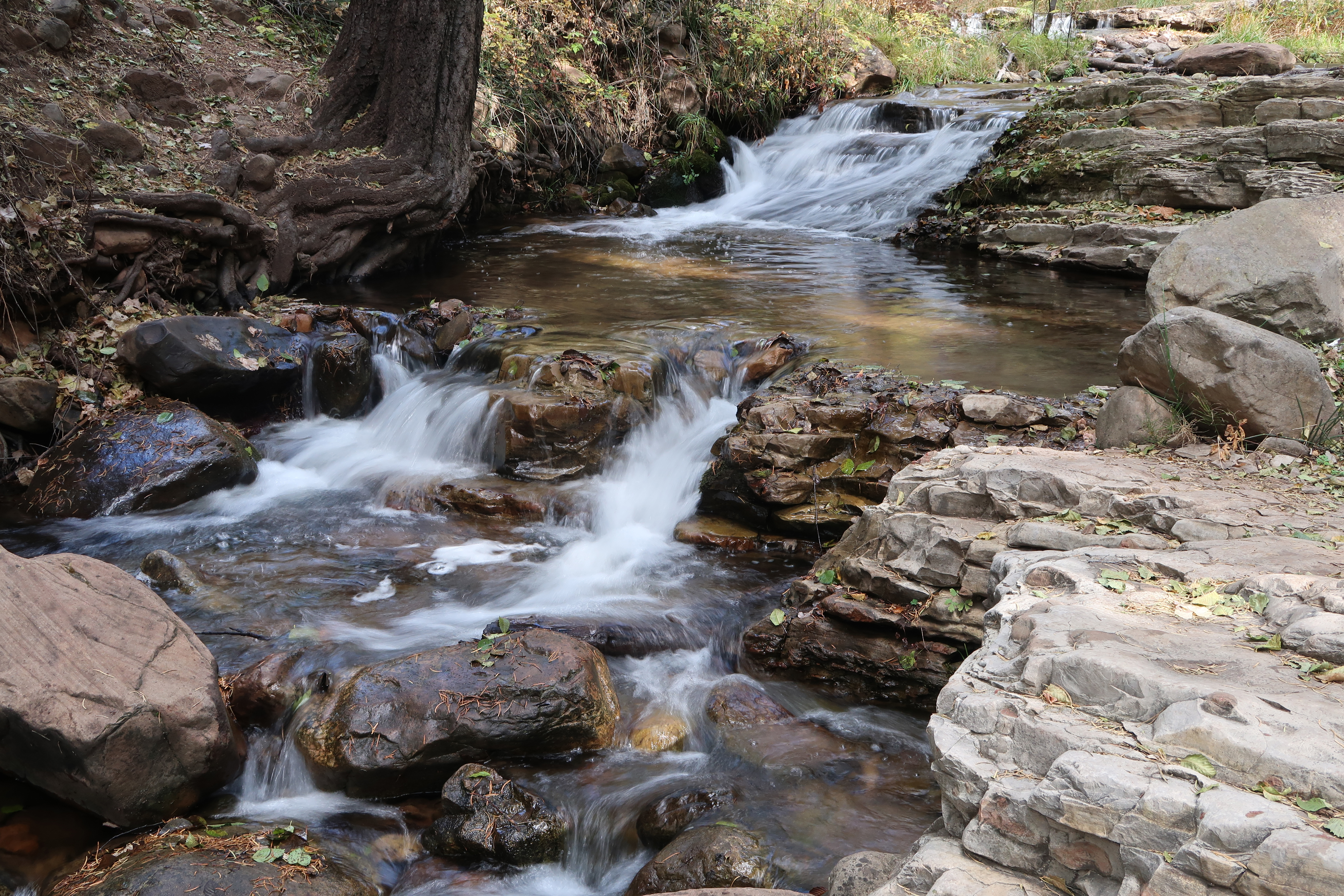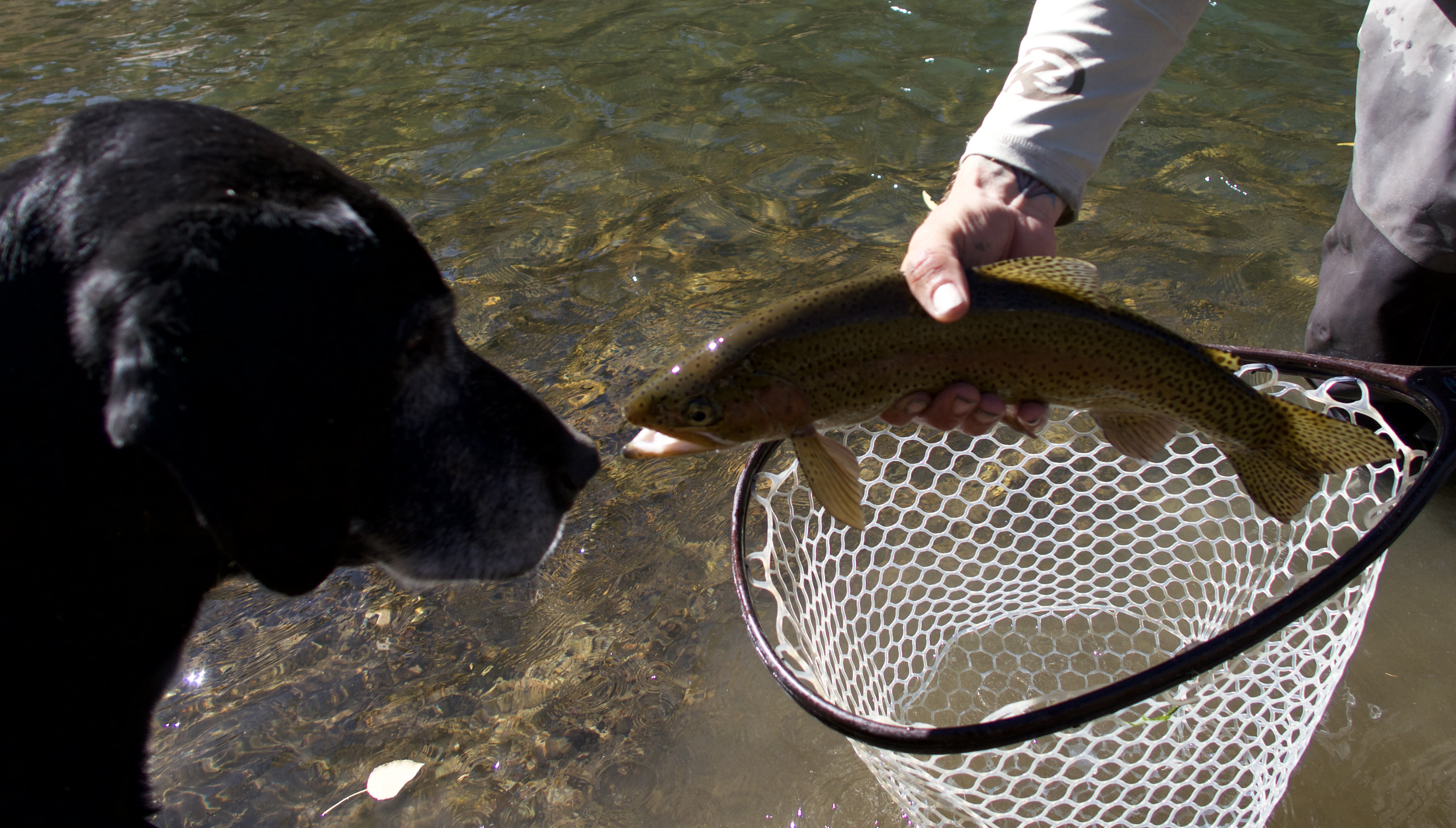
A big fish
Years ago, I caught a good brown trout from a small stream in northern Arizona. As I recall he was about 16-inches, enormous for that water.
That fish wasn’t in the logbooks. For about the last decade I’ve kept notes instead, so I dug through them and found that most of my memories of that day were accurate. I had forgotten a few details. It was springtime. The day was warm, the trees were budding and the hour was late. I walked four miles uphill to a waterfall that shot out of rough, dark stone to form a little creek. Backpackers had pitched tents nearby on whatever patch of flat ground they could find and lit campfires. I started back, and after a quarter mile or so a backpacker who saw my fly rod told me about a nice-looking fishing hole near his camp.
I tied on a small Adams, and it took a few tries to figure out that a roll cast was going to get me caught up in the trees, but a side arm cast would get the fly on the water. I cast a few more times and a good brown trout rolled up to eat. When I finally landed it I measured it against my boot. Later, I laid my boot by a tape measure later and figured he was about 13 or 14-inches. Funny how I remembered just about every detail accurately – the hike upstream, the difficulty getting the drift – everything except the size of the fish. I also didn’t remember the hike out, other than I had a long way to go and didn’t fish any more. What would be the point? I wasn’t going to top that fish, so I savored the moment and walked down the hill. Stars were shining when I got back to the truck.
Not long ago I backpacked into that same creek and caught fish, all of them the 6-inch fish you would expect out of such a small stream. Mostly, I caught them by just being there and getting a good drift, which are the two most important things in fishing any stream, and that was a great day too.
A hundred fish
Lie after lie: That fish was 18 inches. Twenty. I’m going to organize my gear, clean my fly lines, patch my waders.
Perhaps my worst fishing lie is the one where I tell myself I’m going to fish more often. Then life gets in the way. We all have deadlines to meet, bills to pay, the usual crap that somehow piles up when we’re making other plans.
There was a section of water that I was dying to get to before winter, but things kept coming up. It was a small stream that I had written off as unproductive until a co-worker tipped me off: Big fish in there. I somehow convinced a friend of mine that it might be a good place for an overnight backpacking trip. He doesn’t fish, but he went along with the idea anyway, so we threw our packs into his Trooper and headed to the high country. We drove around looking for the trailhead, taking a few wrong turns along the way, relying on a weird combination of map reading and memory, which got us talking. He started to say that your memory can play tricks on you, and we both said it at the same time: but it’s not always wrong either.
“I condense time and miles,” Tom said. “I kind of peanut butter over the bad stuff.” Not long after this we came to a roadblock and a sign that said the trailhead was closed for a construction project, and so my fishing trip unraveled, and I told myself I would get in there in the springtime and who knows, maybe I will, or maybe it was a lie I told myself to take the edge off the winter breeze that swirled as we set off on another trail, into the woods, the fly rod left in the Trooper.
Memory is a filter, preserving the good, editing out detail, redundancy and pain. I’m not sure I’d trade my memories for the real thing even if I could. I have a lot of great memories of people and places, a lifetime of work and play that begins somewhere back in Iowa and meanders around the Southwestern United States for decades. I was sober and hard working, my girlfriends were smart, fun and good looking, my dogs were loyal and well trained. I caught a lot of fish – big, fat trout with broad shoulders and bright colors. I didn’t make much money, but I did the best I could with what I had, which is what life is really all about.

That can get lost in today’s fast-moving world. Far too many people seem to break down reality to a set of numbers. Income. Profit. Share price and net worth, so it’s only natural that they transfer that thinking to fishing – numbers of fish caught, size of fish, nothing but the best gear that money can buy – the usual trappings of a consumer society that doesn’t know when to quit.
Time on the water is a chance to leave all of that behind, to take in the beauty of a mountain stream, the colors of a brook trout, the timeless act of walking and living in the moment without looking at your watch or cell phone. Focus too much on keeping score and a trout, speckled and free, becomes number seven, to paraphrase Thomas McGuane.
Numbers just can’t tell the whole story. We think in images, stills and video clips of past, present and future. I’ve worked for companies that perceived me as little more than a set of numbers: pay, benefits, age, job description. A human resources person might also note that I had a certain level of experience, which would be broken down in years, not in actual experiences. I made friends at those jobs, people that I can still sit down and have a beer with. I married a wonderful woman who worked on one of those jobs, granted her a divorce while starting another. I rambled around the state on the company dime. I left the office a time or two to track down lost dogs, and my bosses were pretty cool about it. Not much of this would show up in my file.
I swear this is true. One day, my boss and I were trying to figure out what I should do for a story on the White Mountains. She said: Why don’t you just go up and fish?
So I did.
It’s hard to look back on a lifetime of fishing and feel guilt, sadness or remorse. Perhaps there are regrets – anyone who says they have none isn’t thinking very hard – but most regrets come with the benefit of hindsight, and they’re usually not worth losing sleep over.
Anglers are people – happy, horny, cranky, sad, and we all have stories, some true, some a distilled version of the truth. What sets one apart from the others is not the ability to catch a lot of fish or big fish, it’s the wisdom to stay humble and be thankful for the opportunity and the experience. There just aren’t that many people in this world lucky enough to spend their days catching fish, much less letting them all go.
A while back I hired a guide on a Colorado mountain stream. I had fished it for years, enough to know that it was a tough river to fish. The guide took it a step further and said it was the toughest river in the lower 48, yet throughout the day he talked about hundred fish days. Could he have been talking about the same river? I suppose he was. Filter out the bullshit and you come up with this: The place fishes better some days than others, which is true of just about everywhere. I didn’t need a guide to tell me that. I didn’t need one to tell me that I should come out during the green drake hatch either, because it was in my notes, but for some reason, that lesson stuck with me when the guide – he of the hundred fish days – said it again and again. The following summer I worked a trip around that hatch, and I did pretty well.
I could toss out some numbers, but what would be the point? Take my word for it – the fishing was great.